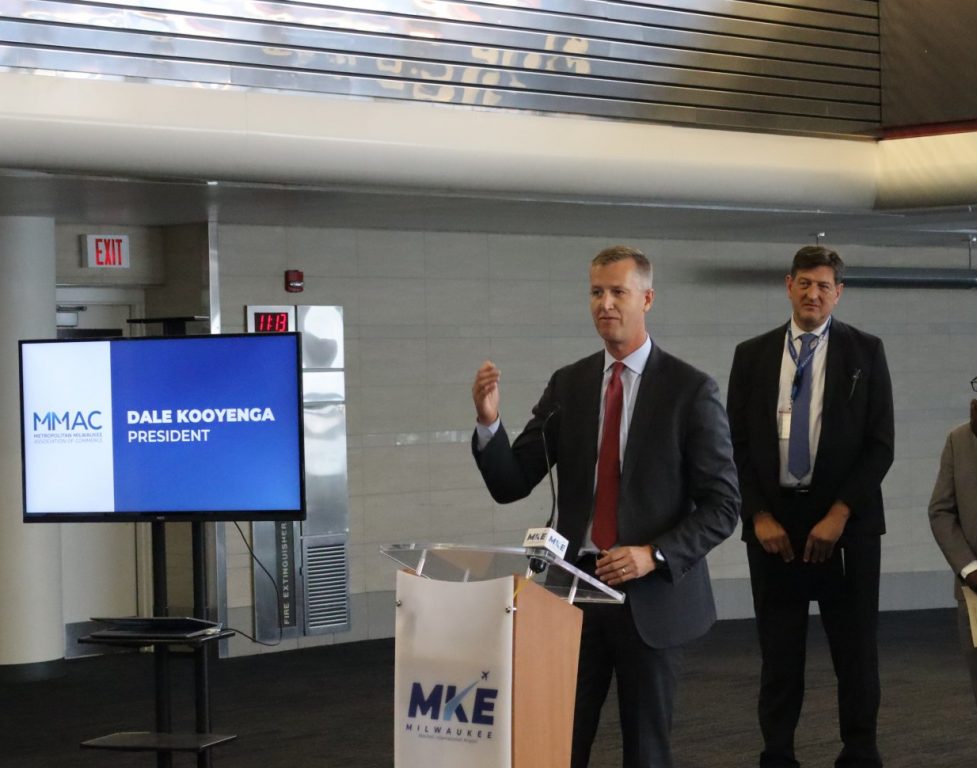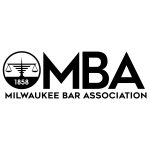MMAC Wants State To Opt Into Federal Voucher School Program
Evers has said participating in the program would be “catastrophic” for public schools.

MMAC CEO Dale Kooyenga. File photo by Graham Kilmer.
Milwaukee’s chamber of commerce is hoping to sway Gov. Tony Evers, or the state’s next governor, into joining the nation’s first federal school voucher-style program.
The Educational Choice for Children Act was included in the reconciliation bill passed by Congress this summer.
The program isn’t a direct voucher. Instead, it will operate as a federal tax credit where people can receive up to a $1,700 credit for donating to nonprofit scholarship-granting organizations. These groups can then distribute the money.
Most of the rules for the program haven’t been written. However, one requirement is included — governors must opt in. Evers told the Milwaukee Journal Sentinel in September that doing so would be “catastrophic” for public schools.
The Metropolitan Milwaukee Association of Commerce, or MMAC, has launched a project to garner support for the federal program.
Although the law doesn’t allow tax credit donations for the program until 2027, MMAC’s “Pay if Forward Wisconsin” is accepting pledges to show Evers, or whoever is governor when it’s time to decide, that there’s demand for the program, said Dale Kooyenga, MMAC president and CEO.
“The pledge campaign will allow us to quantify and identify what the breakout is,” Kooyenga said. “Because we believe that thousands of Wisconsinites want to donate to local schools.”
Kooyenga gave a few examples of where people’s donations could go. He said teachers in Milwaukee Public Schools could direct their federal tax credit back to MPS.
Or parents at a private school could donate to make sure all students, regardless of a family’s income, could go on expensive field trips.
“If you don’t designate where your donation is going, we’re going to prioritize your scholarship for kids in poverty and kids in poverty at schools that have demonstrated the ability to improve reading and math proficiency,” Kooyenga said.
The U.S. Department of the Treasury, which oversees the tax code, is still working out the details of how the $1,700 tax credit program would work.
Kooyenga acknowledges there are a lot of unanswered questions. But he says while the federal rules are being made, MMAC would like the governor to consider that Wisconsin can take advantage of what he calls an opportunity.
Otherwise, Kooyenga says people living in Wisconsin will take advantage of the federal tax credit and their money will go to a scholarship-granting organization in another state.
“This is really a great way to be intentional about philanthropy and intentional about investing in students where they individually need to be invested in,” Kooyenga said. “That’s why we’re really hopeful that the governor will opt Wisconsin in when the rules-making process is done.”
A spokesperson for Evers did not respond to requests for comments on MMAC’s plan.
Heather DuBois Bourenane, executive director of the Wisconsin Public Education Network, said no one knows what the money will go to at this point because the rules haven’t been written.
But she said this is a backdoor initiative to expand vouchers or force them into states that don’t allow them.
“It is just another item on their larger checklist as a way of shifting accountability and control away from trusted democratic mechanisms and into wholly unaccountable new systems that really obscure where the money is coming from, where it’s going and most importantly, how it’s reaching our children,” DuBois Bourenane said.
Wisconsin already has an extensive voucher system, with more than 99,000 students in the state attending private schools using taxpayer-funded vouchers.
Jim Bender, executive director of the Wisconsin Independent Charter School Advocates, said the original aim of the bill was to create a federal voucher school program. But it evolved into the tax credit for scholarship-granting organizations because there wasn’t enough support or money.
“Because of its flexibility and its broad approach, I believe it’s going to take off much more as mini-programs,” Bender said. “Especially here in Wisconsin.”
Milwaukee commerce association launches effort to nudge Wisconsin into federal voucher program was originally published by Wisconsin Public Radio.
If you think stories like this are important, become a member of Urban Milwaukee and help support real, independent journalism. Plus you get some cool added benefits.






















Every Federal grant/credit program will draw a number of scammers who will figure out a way to game the system and walk away will millions. The State of Minnesota has a billion dollar scam related to community based entities falsifying data on lunches that they were suppose to be supplying during covid. The voucher schools already have a high reimbursement from the State while not having the obligation to educate the students who need more services while public schools most often are facing a financial hardship for this reason.
Public education-hater Kooyenga continues his ALEC-fueled campaign to defund and destroy public education. MMAC has always acted in the interests of the rich and against the interests of the working people. Stand tall on this, Tony.